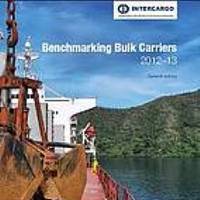Herbert-ABS Opens Singapore Office
Herbert-ABS Software Solutions LLC, a marine regulatory, load management, salvage and ship design software company, has opened an office in Singapore to reinforce service and support for Asia-based shipowners, operators and shipyards, the company said. The new office will be led by Director and Naval Architect Rob Tagg, who will expand the activities and strategic plans of Herbert Engineering and Herbert-ABS Software, primarily supporting installations and sales of its CargoMax and HECSALV software products. Herbert-ABS is a joint venture with ABS so the expansion to Singapore is also intended to leverage the strong local presence they have in Southeast Asia.
UK Club Best in Intercargo Port State Control Benchmarking Study

Bulk carriers entered in the UK Club have the lowest number of Port State Control deficiencies when inspected according to the latest edition of “Benchmarking Bulk Carriers” published by Intercargo, and reported in the UK Club''s news. The dry cargo shipowners association report states that UK Club ships average only 1.42 deficiencies per inspection compared to an average across the International Group of 2.16. The report also shows the individual P&I club market share of Intercargo membership. The UK Club, alongside the Japan Club, clearly leads in terms of market share with just over 12%.
Greece's Safe Bulkers Weather Challenging Financial Conditions
Bulk carrier owners & charterers Safe Bulkers, Inc. reports results for the third quarter and the first nine months of 2012, pays reduced dividend. Net revenue for the third quarter of 2012 increased by 10.1% to $46.8 million from $42.5 million during the same period in 2011. Net income for the third quarter of 2012 increased by 4.5% to $20.7 million from $19.8 million during the same period in 2011. Adjusted net income1 for the third quarter of 2012 decreased by 12.0% to $22.8 million from $25.9 million during the same period in 2011. Net revenue for the nine-months period ended September 30, 2012 increased by 9.5% to $138.0 million from $126.0 million during the same period in 2011.
Bulk Carrier Owners' Stock Price Not Up to the Mark
Seanergy Maritime Holdings Corp. (the “Company”) (NASDAQ: SHIP) announce it has received written notification from The Nasdaq Stock Market (“Nasdaq”) dated June 29, 2012, indicating that because the market value of the publicly held shares (“MVPHS”) of the Company’s common stock for 30 consecutive business days, from May 16, 2012 to June 28, 2012, was below the minimum requirement of $5,000,000 for the continued listing on the Nasdaq Global Market, the Company is not in compliance with Nasdaq Listing Rule 5450(b)(1)(C). The applicable grace period to regain compliance is 180 days. The Company intends to monitor the MVPHS of its common stock between now and December 26, 2012 and is considering its options in order to regain compliance with the Nasdaq Global Market MVPHS requirement.
The China Factor
In recent weeks, we have examined various aspects of Chinese shipping developments and we make no apology for reporting a recent New York conference at which China was again the key focus. The country is, after all, the principal factor that is fueling the dry and liquid bulk markets and the container trades. Only a few tanker owners can remember super-profits on today’s scale and bulk carrier owners have only ever dreamt of the rates prevailing today. Shipbuilding capacity in China, meanwhile, is expanding at an exponential rate and, in the long term, it is the shipbuilders’ strategy to be building half of the world’s ships by 2050. They could be doing that long before then, some already believe.
Shipping Groups: A Need For Better Policing
The eight main shipping organizations said they have agreed the need to set up better self-policing and accident investigation procedures after the Erika pollution incident off France. A working group to review links in the chain of responsibility to prevent disasters like the Erika will be set up, the shipping organizations said. The 25 year old tanker Erika broke in two off France last December causing massive pollution to western French beaches after it spilled about 10,000 tons of its fuel oil cargo. The review would address issues of transparency, internal and external investigation procedures and accountability of industry self-policing, the organizations said. Weaknesses in all these elements of the industry have been criticized since the Erika sank.
The Shipping Lottery
Seasoned shipping men can be forgiven a smug smile or two this week as plummeting stocks have left share speculators reeling with the speed of their descent. Having reached record levels a week ago, both US and European shipping shares have come tumbling down this week, following warnings from US analysts on Monday. Amongst them are leading tanker companies like Frontline – down from almost $55 at last Friday’s close to just under $48 in New York at midday on Thursday this week. General Maritime was sharply down too, registering a fall of almost 14%, from over $40 to about $35. Other leading shares were sharply down too, including Teekay, Knightsbridge and Tsakos Energy Navigation in New York and P&O Nedlloyd, A.P.Moller-Maersk, Norden and Torm in Europe.
Shipping Organizations Agree On Improved Self Policing
The eight main shipping organizations said on Friday they have agreed the need to set up better self policing and accident investigation procedures after the Erika pollution incident off France. A working group to review links in the chain of responsibility to prevent disasters like the Erika will be set up, the shipping organizations said. The 25-year-old tanker Erika broke in two off France last December causing massive pollution to western French beaches after it spilled about 10,000 tons of its fuel oil cargo. The review would address issues of transparency, internal and external investigation procedures and accountability of industry self-policing, the organizations said. Weaknesses in all these elements of the industry have been criticized since the Erika sank.







